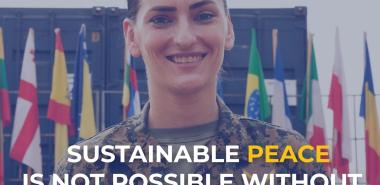Implementing the Women, Peace and Security agenda
The EU actively implements the UN Security Council Resolution 1325 on Women, Peace and Security (WPS Agenda). It is one of the core principles of the EU Common Foreign and Security Policy. The implementation of the WPS agenda represents an essential tool in ensuring that the rights, agency and protection of women and girls are observed and upheld at all times, and to confirm that a meaningful and equal participation of women is secured in all institutions and processes of conflict prevention, peace-making, peacebuilding and post-conflict rehabilitation. An example of this is the inclusion of gender and human rights perspectives in all EU CSDP Missions to support the implementation of Women, Peace and Security in their respective interventions.
In Focus
Navigate the topic
Gender Equality & the Women, Peace & Security agenda
Peace processes should reflect the wider society they seek to bring together. The EU, as well as the wider international community, shares the goal to support and advance the involvement of women, including women human rights defenders and women peacebuilders, in peace and security processes at all levels, also by ensuring their safety and security. Peace processes must take into account gender norms and roles, and analyse the conflict through a gender lens.
The EU policy framework on Women, Peace and Security include the 2018 Council Conclusions on WPS and the EU Strategic Approach to WPS, the related Action Plan (2019-2024) and the 2022 Council Conclusions on WPS. The EU implements its Action Plan on WPS which identifies clear objectives and fulfilment criteria, under the key priority areas of:
- prevention;
- protection;
- relief and recovery; and the three overarching and cross-cutting principles of
- participation;
- gender mainstreaming; and
- leading by example.
The EU objectives on WPS are achieved, among others, through political and diplomatic engagement of EU leadership and by integrating a gender perspective and ensuring women's participation and leadership in all peace and security-related contexts. It is also necessary to take specific measures, including targeted training for the military, justice and security forces. Synergies between the WPS agenda and the other thematic priorities will be harnessed. WPS monitoring and reporting is aligned with the GAP III, also to fully integrate the EU policy framework on WPS in the EU’s overall gender equality policy framework.
Furthermore, the EU are committed to implement the WPS agenda in close cooperation with allies and partners notably civil society organisations and the broader community of implementers. Several formalised partnerships are already established where WPS forms one of the priorities for cooperation such as with the UN, NATO and within the context of the ASEAN Regional Forum.








